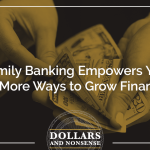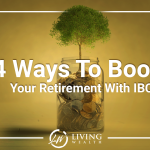In this episode, we discuss why it is crucial to own infinite banking policies to financially protect yourself and your family even if the policies are not earning an income.
Financially Protect Yourself and Your Family Topics:
- Going beyond cash values and infinite banking strategies
- The importance of a death benefit for those you leave behind
- What most people don’t consider, the impact of losing a young child and the aftermath
- Insulating yourself financally from an emotionally devistating time
- How soon to ensure children
- How much to start with
- Planning for the future and leveraging for college tution
- Health care expenses
Episode Takeaways:
- If you’re the main income earner, we want to make sure you’re settled. But don’t discount putting a policy in place soon after a child is born.
Episode Resources:
Podcast transcript for episode 76: Financially Protect Yourself and Your Family
Nate: In this episode, we will discuss why it is so important to own infinite banking policies, not only on you, but also on other members of your family, even if they are not earning an income. She’s Holly and she helps people find financial freedom.
Holly: He’s Nate. He makes sense out of money. This is Dollars and Nonsense. If you follow the herd, you will be slaughtered.
One of the reasons why we really want to talk about this is both of us have personal stories of individuals we know that have lost a loved one and the effect that can have on them. When I think of if I lost one of my children or I lost my husband, the financial impact, I don’t think financially the impact, I think what has to change in our life. As the breadwinner, going out and working every day, you don’t do all the little needs and wants that happen and how that has to change. And so for me, I know I want to make sure that I can have the time I needed to grieve, but also to be present with my family. And so it was really important to know, not just have something on my spouse, my husband, but also on my kid should something happen to them, so that if they’re lost or they graduate from this earth, I don’t have to go back to… you said it very well, I don’t have to go back to work on Monday.
Nate: Yeah. This episode is not quite like our normal ones, you could say, because, normally we’re talking about financial concepts, building wealth, different strategies and techniques. But, today is a little bit more of a somber note to some degree. It’s maybe more focused on the other part of infinite banking, the insurance part that we’ve, just recently, things have happened to some people in our circle that, really we’ve just felt it in our heart to share with our audience some of those things, like Holly was saying.
I think a lot of times when we’re talking about infinite banking, we’re so focused on cash value. It’s such an important part but, obviously, these policies come with death benefit. And so, there can be a lot of value in buying policies not only on the breadwinner, the person who is earning the income, but on the other members of the family. Not only financially, but emotionally and different things, like you had mentioned for your life. I know in my life, I’ve thought about what happens if something happened to my wife, something happened to my kids, and I want to take as much time as I possibly need to cope with that and to get the family adjusted and to mourn for that. We’ve seen issues where the reason it becomes so particular, and I bet lots of our listeners, they know friends in their circle or family members have died.
Right now, we’re all trusting in my GoFundMe accounts to help support. It can be a difficult thing. Recently, there was an individual in my circle, their son, their three year old son, randomly died of meningitis within a 24 hour period. Healthy, suddenly got really sick, didn’t even [inaudible 00:03:11] went south and 24 hours later, had passed away. Just utter shock, just brutal situation. They were clients of mine. As an advisor, I look at them and I know, and from all of the stories [inaudible 00:03:20], he didn’t have a policy. Most kids, if they do have a policy, it’s like one we were talking about a Gerber Life Plan. It was like $15,000, $20,000, $25,000 which mainly it might cover the funeral and the memorial for him.
But yeah, the family, got to trust in a GoFundMe account or they’re just going to have to go back to work within a very short period of time. And they just don’t get the time together after to get through it. This podcast is going to be about the many reasons why we suggest that, don’t just leave it on you. It can make a lot of sense to have it on …
And sometimes a person, I’m going to be honest, if you’re my client and you’re listening to this, I don’t do a good enough job stressing to you. Because a lot of times I’ll talk to people and I say, well, if you’re the main income earner, we want to make sure you’re settled. And I think that’s true, but I don’t want to discount that as soon as my kids are born, I’ve got three within two weeks, there’s an application to get a banking policy on him for a lot of reasons. One of them being, man, if something happened in six months and they passed away, my wife and I would just be a wreck for a long time and we don’t want to have money ever be an issue in that front.
Holly: It’s focusing not just on the cash, right, but the death benefit as well, but you get a bonus. I call it a bonus when I’m talking to clients, but the bonus is should your loved one graduate from this earth, the bonuses, the death benefit that passes and you can hope and pray that you never have to bury your child. But I have a client and I have even friends that just within the last year, both had two bury young children, 13 and younger. Not because of even an illness like where you stay healthy, but just an accident that occurred. And when you think of that and there’s nothing in place, one family said if it wasn’t for GoFundMe we wouldn’t have anything. We couldn’t survive or live because of what has happened. And they’ve been able to grieve and take that time and as well as have counseling but it was GoFundMe that provided that.
Nate: For me, the reasons I have it on my family members is a couple-fold. So, obviously as I already mentioned, the death benefits we’re bringing up, but so many people think of insurance as only that. And then our side tends to think of insurance as practically only cash value. And there is this beautiful blend that really occurs, especially when doing for infinite banking. The policies I have, they’re larger than almost anyone would ever buy on the child, you could say. Most kids $25 to $50,000 is like a normal policy. That’s actually pretty good for most kids. And but mine’s are closer to a million, you know of actual. Don’t get too crazy, they’re all really young. So a dollar buys a lot of insurance there.
But I get to kill two birds with one stone because I’m also planning for the future. I want them to be able to have a policy that they can borrow from to go to college and pay it back and keep all the money in the family. I want them to do a lot of the banking things, and I’m going to use the policies now while they’re growing up, while we’ll be doing things with them. So the infinite banking all remains the same. So I’m not just doing it for a death benefit. I think that’s important to know. But, I’m okay getting a larger policy on them because I know that it’s not, it’s not just the death benefit. I’m not just getting it for that risk. But it’s one thing that we don’t like to talk about. I don’t like talking about it. No one likes to talk about it. But I see it happening.
And my next door neighbor growing up. She didn’t work and the husband worked. He gets killed on the job. He was a scaffolding [inaudible 00:09:48], here’s on the scaffolding and he died on, crashing down into the round. And I didn’t know for sure there was some settlement from the company, but it wasn’t huge. It was not nearly what it probably should have been. So she had to go back to work within about three or four years. She hadn’t worked in years. I wasn’t even doing infinite banking at the time personally. But, I remember thinking, it was right in that time, this is probably seven, eight years ago, it was right in that time that I was learning infinite banking. I was thinking, man, I did not want my wife to have to go to work if I pass away. Because right now she’s a stay-at-home mom. We have three babies. The oldest one’s three and a half. I’m like, if I was to die today, yeah, I also don’t want her to go back to work. But I was thinking no. And she’s a homemaker, this is what she loves to do. She wants to be a mom, she wants to be a grandma. She wants to do those things.
It’s not like a need thing for me. I know a lot of insurance concepts that go, how much do you need? How much do you want? I want to have way more than than she needs. I want her to be financially stable. I want my kids to receive the legacy that I’m trying to build for them, whether I live or not. So sometimes we give the death benefit a short end of the stick.
Holly: Actually, fine. Well because often times we need money to live today. But when you think of the death benefit, what I often tell clients is, but it’s like you said Nate, if something happened to you, your family needs the money to live going forward, and that’s the death benefit part. Not the money you provided today, but if the money stops, they need that money moving forward.
For me, I very much thought the same way Nate did, but I thought I do not ever want my husband or my children to want or have to change their lifestyle should something happen to me. They wouldn’t have to move into maybe an apartment or something like that. They could still have a house. He could still homeschool. And they could still do the things they love to do and not be penny pinching [crosstalk 00:08:36] or-
Nate: I don’t care if you leave $1 million. Sounds like a lot of money [crosstalk 00:08:38], but that’s not a lot of money. Especially if the other individual is not working, that is going to be blown through in the matter of 10 years or less.
Holly: … Or less. They say about 80% of anything left. If you haven’t planned accordingly, like of $1 million or something, they say typically within 18 months it’s gone.
Nate: Yeah, it happens so fast and you’re right, most people, they’re penny pinching all the time and you’re like, “No, we don’t penny pinch while I’m alive. I don’t want that to change.
Announcer: Have you ever wondered how to stop worrying and just make and keep more of your money? We believe in challenging the status quo. We believe in divine conventional wealth tools while maintaining traditional values. After all, most of those conventional tools only ever seem to make someone else on the inner circle rich. You can become debt-free, in control, secure, and achieve financial significance. Private family financing can be used in your life and even your business. Let us help set you free from worry. Visit livingwealth.com/freedom to receive your free copy of The Tree of Wealth. You’ll learn about the tools banks themselves use and rarely speak about openly.
These are the strategies used to launch Disney, JC Penny’s, and countless successful families. For more than 46 years, Living Wealth has focused on treating clients with respect and honesty, while helping them achieve financial freedom. Learn how to turn your hard work into significance. Visit livingwealth.com/freedom to instantly receive your free copy of The Tree of Wealth. You’ll be enabled to have cash today and in the future. It’s more than mere infinite banking. It’s private family financing. Don’t let banks and Wall Street dictate your financial future. Go to livingwealth.com/freedom to instantly receive your free copy of The Tree of Wealth. Now, back to Nate and Holly.
Nate: A lot of times when someone buys life insurance, they just think about this need thing. Do you need a policy on your son more than what it costs to bury him, or your daughter? I guess, no, I guess. But, are you kidding me? Like don’t you want to be able to mourn? I just don’t want my child to die and then suddenly be like, not only do I have this extremely traumatic event, that is emotionally and spiritually draining, and then on top of that I’m stressed out about money and making sure I go back to work and-
Holly: Providing for the family [crosstalk 00:11:15].
Nate: … I don’t even want that to be a thought. Is it true that I might want to get normalized at some point and start working again? Yeah, but I don’t know how long that’s going to take or what’s going to happen. So all of this to say I have failed some of my clients by focusing too much on the breadwinner. Because I do think it’s very important that the breadwinner gets heavily insured because that is the biggest financial impact. But I think I’ve shorted some people because I’m giving them advice that I don’t know if I would take it because in reality what I’m doing is getting policies on all my family members, as much as I can, as big as I can, as soon as I can, because I’ve seen it in the industry.
I’ve seen it in my own life and then with others. People dying without leaving much and not having a banking policy or any policy set up and now their family … What you think seems like a lot of money, if you’re 40 years old and you pass away and your wife is a stay-at-home mom or your husband is a stay- at-home dad, $1 million does not go very far. We think that’s just a big sum of money. No, it’s not. Now do they need more? Some people are like, no, she’ll just go back to work. He’ll just go back to work, whatever. Well, sure, maybe they will anyway. But, with a banking policy, it’s not like you’re having to choose whether I get death benefit or cash, because we have both. The goal is just let’s show pour money in. The money can do more than one thing, it can be growing for you. We can be borrowing from and using it. It can be boosting [inaudible 00:12:31]. It can be really fun once you get into it. So don’t discount it and see it for what it really is that there’s some value there.
Holly: I think the other thing I want to add too that we haven’t really talked about too is, but you never know when you could become uninsurable. You want on your kids policies, or even your spouse, because you don’t know what’s going to happen to make them uninsurable. And so, one of the benefits is being able to ensure somebody, and like Nate said, I’m just going to say it doesn’t cost much to ensure a child. Sometimes I have a client saying I want to put this much in. And I’m like, you can’t. Because there’s too much death benefit on a child. But on the same way, even with your spouse and that, let’s say they got a chronic illness or a terminal illness. If you have a policy on them, you have also the death benefit you can use with most life insurance companies right now to help pay for care and stuff while they’re still alive. And that goes a tremendous amount when I’m going to say the breadwinner is the one that’s sick.
Nate: You’re right. I remember when my oldest son, when he was one, he already had a big policy on him. Big, quote, unquote, for a child that’s obnoxious, in most people’s eyes. But that’s what I was all about. And when he was one, he had a bout with a couple of seizures, which it just turned out was just what’s called a febrile seizure. So it wasn’t, at least he’s now almost four. So it’s been about three years since the event occurred and there hasn’t been anything else so they’re not concerned about epilepsy or anything like that. But if we could go back and at that moment I was like, man, I’m so happy that this falls on him now. It was a very traumatic event, but I was thinking at least in that short period of time, it would have been difficult to get a policy.
They’d be like, “What’s going on? Insurance company, “Does he have epilepsy or not.?” And if he had then we got the policy in before it was discovered. That way that policy’s in force, there’s nothing they can do to you. That’s one of the things that we tell people with kids. We’ve had some that are diagnosed with autism, few years old, it can be difficult to get a policy with that. Some chronic conditions that, it’s just best as you said, to do it as soon as you can to avoid the potential of them becoming uninsurable and never being able to get a policy on them for the rest of their life.
Holly: Well, I know even for me, my middle daughter, she was the quickest one. Well my oldest one and my middle one had policies pretty quick. But about three months after she was, she had what was called a hemangioma, which is extra blood vessels, but they can be cancerous possibly. But it actually was under her eye and into her brain. Until she was a certain age, she couldn’t even do a MRI because of having to be still in that. And if we hadn’t had the policies, we literally would have had to probably wait two and a half, three years just to get a policy on her. But because we were quick-
Nate: Before it was found out.
Holly: … to the get-go and they even, I promise it sounds like it grew up or not, but like it wasn’t there one day and then all of a sudden it was there. And …
Nate: So I’m not saying like when you get found out, try to-
Holly: No.
Nate: … it wasn’t like … don’t trick an insurance company. That’s dangerous. [crosstalk 00:15:27].
Holly: Well, what we’re saying is, you never know.
Nate: You never know.
Holly: I’ve had story .. Nelson, the founder of Infinite Banking, his granddaughter, they waited to do the policy and she was diagnosed with cancer. And so he said it took 10 years to make it up what they lost and to be able to get a policy. So, what we’re saying is don’t wait just because you think they don’t need it. Even the smaller policies, some of them are only $10,000 and I’m just telling you burial and this and that will probably eat most of that. [inaudible 00:16:03] and then you’re like, I’ve got to go back to work. Or, I know clients that have had their grievment or that for immediate family is something like a week or five days. That’s what they get with the company. That’s all they get. And they got to go back to work, and I just want to be able to have the freedom to say I’m not ready to go back to work. Or I’m not ready to do that, I haven’t gone through my process yet or grieving. I’m like [inaudible 00:16:30]. I tell my kids, don’t talk about that. I don’t want to talk about it.
Nate: I don’t even want to think about it. In fact, I don’t even want to keep talking about it on this podcast. So, for those of you who are my clients or Holly’s [inaudible 00:16:40] that I may have not done a great job about the importance of getting a policy on your family members even if they don’t work. I think it’s very important. I’ve seen some damaging things happen and just continue banking and pushing yourself to grow. I’ve got a lot of policies, and I keep opening them. I still love them. There’s so much value to create. Don’t get caught up with, do I have enough? Just enjoy it for building it what it is. Whether it’s you, whether it’s your spouse, whether it’s your kids. Money is the furthest thing from my concern. I feel like that’s what we want to be at, if we can.
Holly: Yeah. And I think too, I’m just going to say this for me, I have great joy. Like Nate said, I know my kids are going to be able to use these policies. They haven’t really used them, but while I can, I’m going to use them in the same way. When you think, well, why would you have this kind of death benefit on a kid or this or that? Mine is more of a legacy for their future. It’s something that I get to pour into money and live and they get to do things with. But then even when I graduate, for me, this is a gift I’m giving them. You look at it both ways. It’s not only cash, it’s also death benefits should something happen. But it also is an inheritance you get to pass on to them.
Nate: Both for you, your spouse, and then as Nelson’s talked about buying policies on your kids and your grandkids can be such a huge impact for generational legacy and generational wealth because these death benefits are guaranteed to pass down. So a lot of value. I encourage you guys to continue learning to build wealth. Go listen to the rest of our podcast for those focused, but today was a little bit more heavy, more somber, but we did just go along with our hearts with some things that were happening to people that were close to us that it was a good idea to share some of the concerns we have for those who have nothing on their non-working spouse or for their children. So guys, this has been Dollars and Nonsense. If you follow the herd, you will be slaughtered.
Holly: For free transcripts and resources, please visit livingwealth.com/e76.









